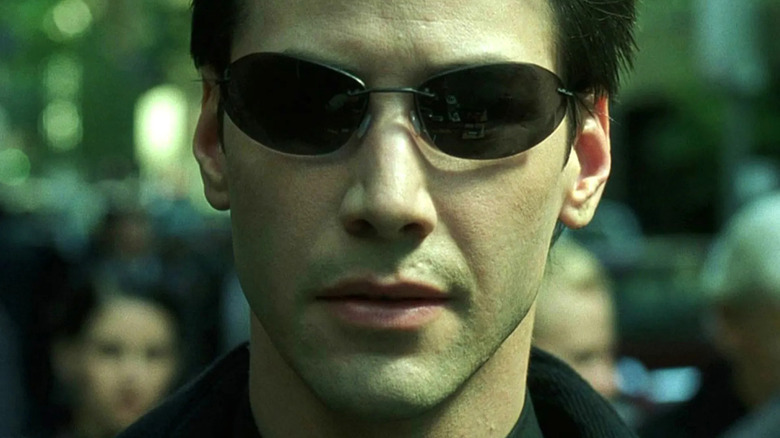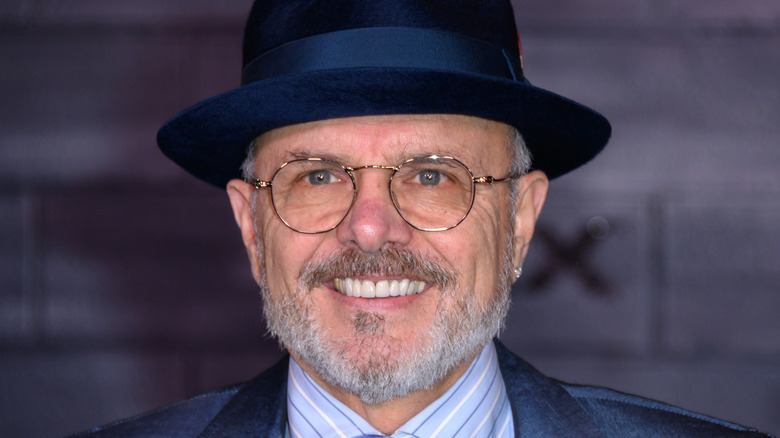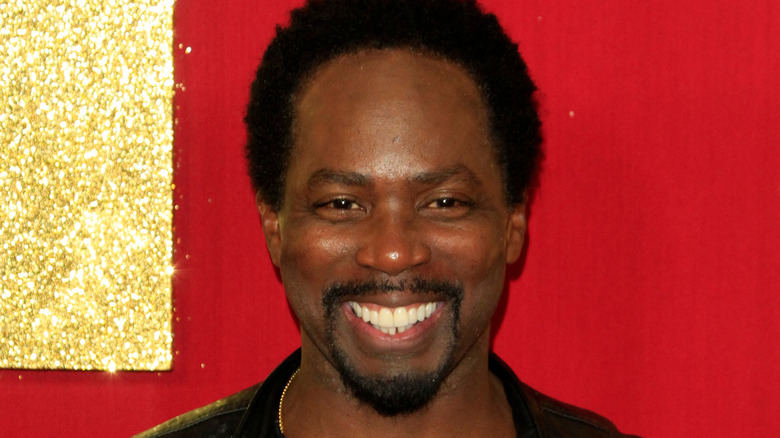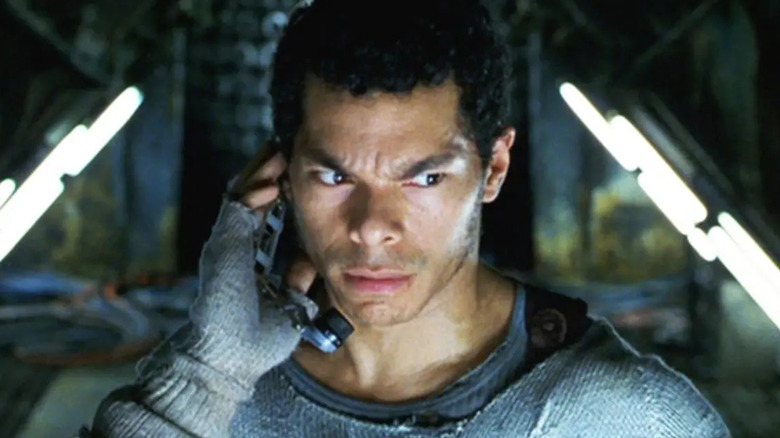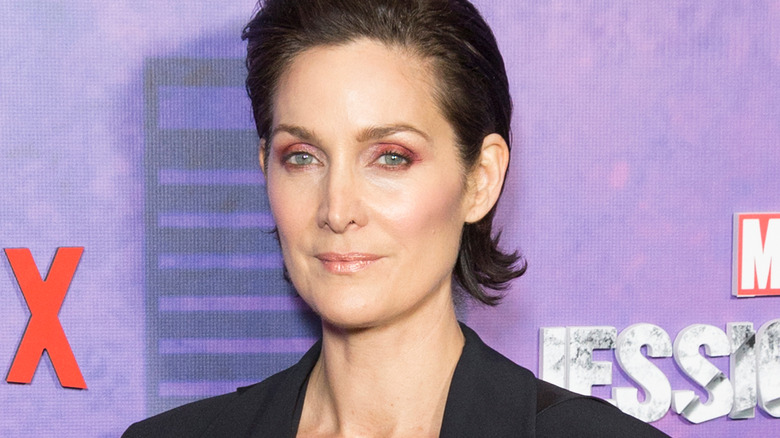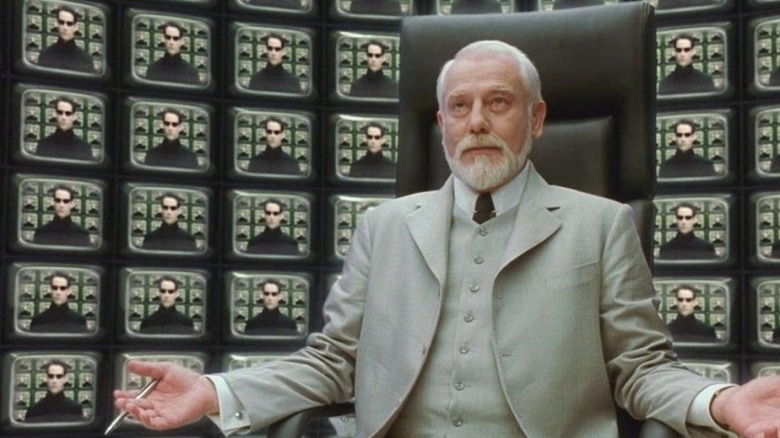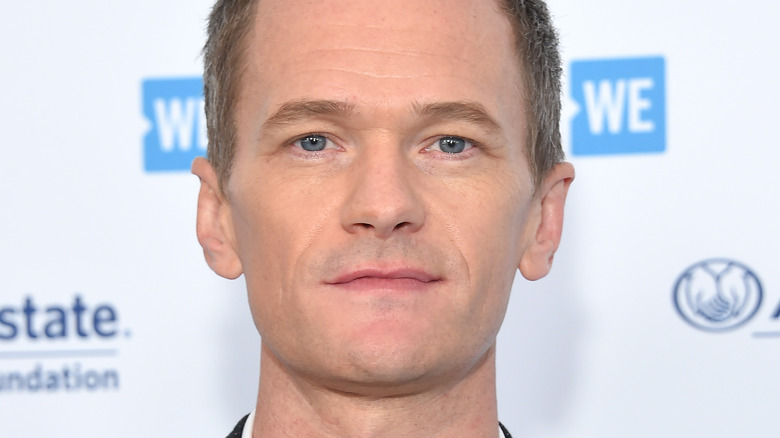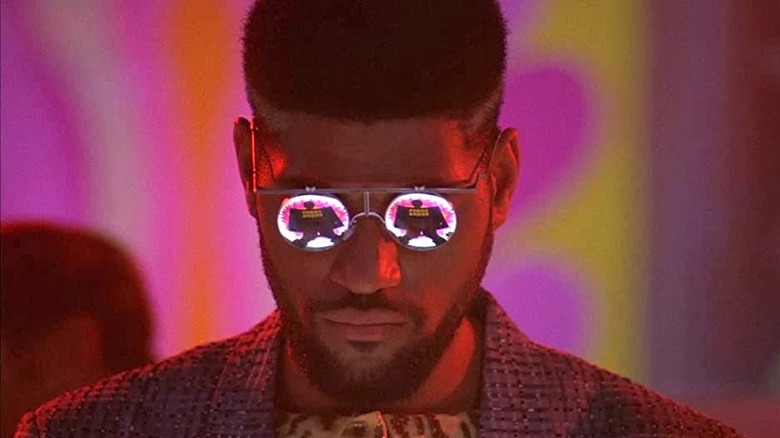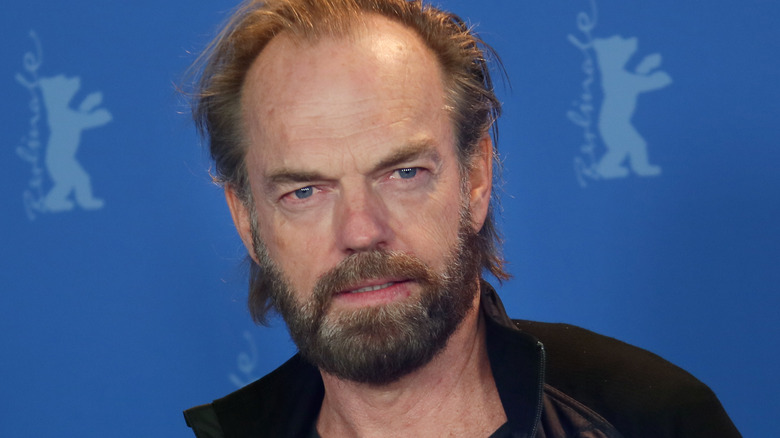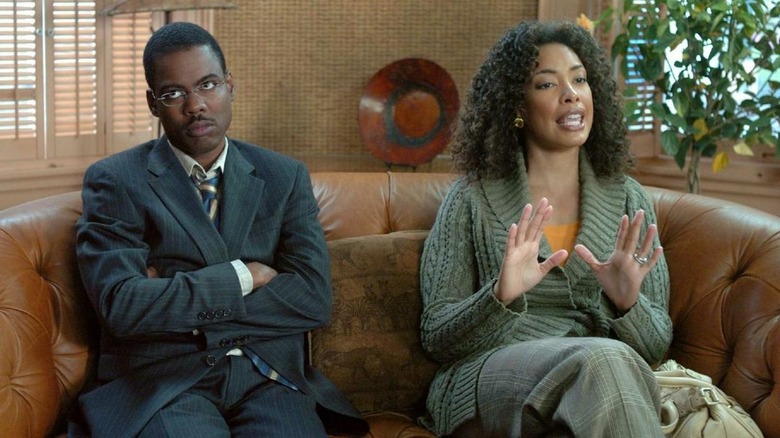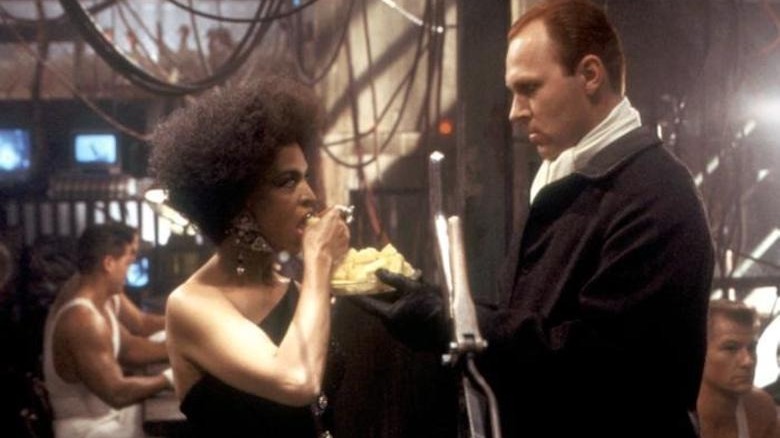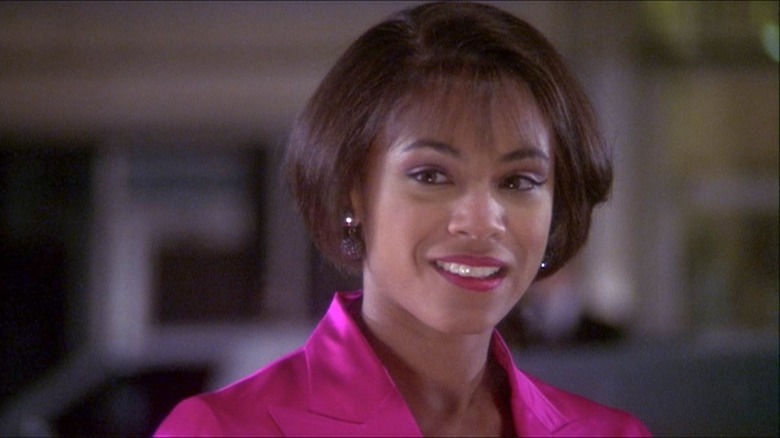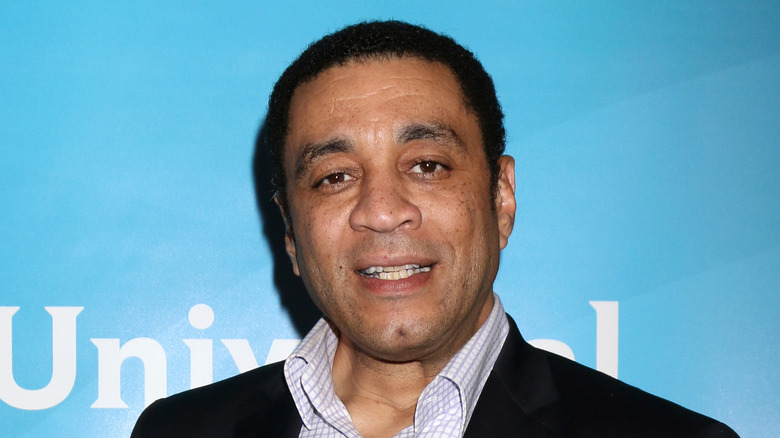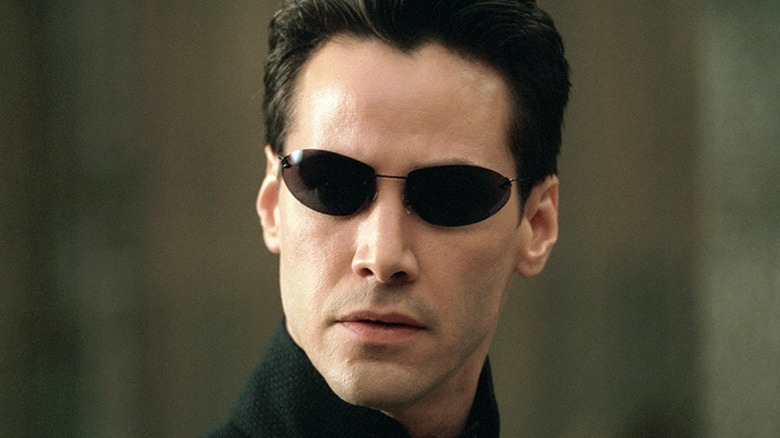Early Roles The Cast Of The Matrix Movies Want You To Forget About
Taking the world by storm in 1999, "The Matrix" changed the face of action movies forever and was a watershed moment across multiple genres. Popularizing a number of sci-fi concepts and coining several new terms that became a part of our cultural landscape, the franchise created by Lana and Lilly Wachowski also served as pointed social allegory, with political and social subtexts that people are still uncovering to this day.
Starring a mix of established stars, lesser-known names, and newcomers, the original trilogy of films and the 2021 legacy sequel featured broad ensemble casts. Big-screen icons like Keanu Reeves and Laurence Fishburne helped catapult a number of young actors to stardom, including Carrie-Anne Moss and Jada Pinkett-Smith, while turning veteran journeymen like Hugo Weaving into household names.
Whether they were big names already or emerging stars, they can all proudly point to their time in one of Hollywood's greatest sci-fi movie franchises. Thanks to "The Matrix," many of them could also thankfully bury some earlier, regrettable roles under a major box office smash. But we're not going to let them get off that easy. So plug in, upload, and follow the white rabbit, because this is a list of early roles that the cast of "The Matrix" movies want you to forget about.
Joe Pantaliano: Robot in the Family
What might be the absolute worst film on this sad list of movies — if not the worst role and performance too — is the 1994 family comedy "Robot in the Family," starring Joe Pantoliano. During an era where comedies about a misfit family were having a measure of success — with hits like "Beethoven," "Problem Child," and "Parenthood" — Pantoliano may have thought he found a winner in the story of a family that welcomes a robot into their home. Alas, it was anything but.
The actor who would go on to play the traitorous Cypher stars here as Jack Shamir, a father and antique dealer. He also dabbles in high tech robot technology and constructs a vaguely humanoid pile of parts in an effort to help around the house and babysit his kids. But the robot can somehow also detect gold, earning him the nickname — and his own bizarre original theme song — "Golddigger," as well as making him the target of a rival antique store owner (John Rhys Davies).
A film that somehow makes Pantoliano's "Baby's Day Out" look like a masterpiece, "Robot in the Family" is a genuinely inexplicable cacophony of nonsense. There's barely a story, and the robot is neither interesting nor funny, but merely annoying, not to mention incredibly cheap-looking. But the most truly head-scratching choice? Having Pantoliano fake a bad Turkish accent.
Harold Perrineau: On_Line
Though "Robot in the Family" may be the worst film on this list of losers, the 2003 erotic thiller "On_Line" — and we use both of those terms very loosely — is without a doubt the most cringe-inducing film you're likely to find from one of the cast of "The Matrix." It stars Harold Perrineau, best known today for roles in "Lost" and "Oz," and who played a major role in "The Matrix Reloaded" and "The Matrix Revolutions" just a year after this abominable effort.
Nearly amateurish in execution, "On_Line" seems to have been made on a budget of zero dollars. It follows two friends (Perrineau and Josh Hamilton) who start their own adult website offering up web-based fantasy fulfillment that goes horribly wrong. Matters get further complicated when one of them becomes infatuated with a woman named Angel, who lives her entire life over a low-res webcam.
Aside from the bad acting, terrible production, and groan-worthy story, "On_Line" isn't quite sure if it's trying to be funny, scary, or something in between. Maybe it's trying to say something about the emergence of online dating, but nothing really adds up. Not creepy enough to be a horror movie, not exciting enough to be a thriller, and not funny enough to make it a satirical black comedy, it's simply an uncomfortable watch from beginning to end.
Marcus Chong: Evil Altar
Though he's essentially retired from acting at this point, and never had much of a career before or after "The Matrix," Marcus Chong can proudly say that he had a major role in one of the landmark films of the 1990s. But even if it's the only major film role Chong ever had, he still has a few more that he probably wishes we'd forget about. Case in point: the 1988 B-grade horror movie "Evil Altar."
The story of a devilish cult that arrives in a small town to wreak havoc on its oblivious denizens, it features a warlock (William Smith) collecting sacrificial souls with the help of a corrupt sheriff (Robert Z'Dar). Though his role is small, Chong would probably rather have us focus our attention on "The Matrix" or even his recurring role in the '90s TV crime drama "Street Justice," starring Carl Weathers, as "Evil Altar" is a work worthy of any actor's hall of shame.
Not to say there are no redeeming qualities here: it definitely falls in the category of "so-bad-its-good" schlockfests, if that's something you enjoy. Maybe you like laughing at hilariously bad movies, and if so, this one should do it for you. But for Chong, "Evil Altar" is definitely a low point that we can't imagine he looks back on very fondly.
Carrie-Anne Moss: Lethal Tender
Carrie-Anne Moss landed her breakout role in "The Matrix" in 1999 after just a handful of early films, turning overnight into one of the hottest names in Hollywood. Though her time on the A-List was short-lived, there's no denying her on-screen talent, to which her part in Netflix's "Jessica Jones" and her lead role in the Norwegian thriller "Wisting" can attest. Sadly, despite her formidable screen presence and immense ability, Moss has appeared in a number of awful movies throughout her career, and a few early ones definitely stand out. Topping the list is the forgotten Jeff Fahey-Gary Busey action movie "Lethal Tender," which looks like it was designed for cheap second-run theaters.
The film focuses on a Chicago cop (Fahey) who must stop a diabolical gang of villains from poisoning the WIndy City's water supply. Moss stars as a hostage taken by the baddies and used as a bargaining chip, after Fahey's oddball officer discovers the situation when he's sent to the city's water control plant to corral rowdy protesters.
A low-rent action movie with a hilariously awkward pun for a title ("legal tender," get it?), "Lethal Tender" somehow tries to turn Jeff Fahey into the next Keanu Reeves. But it's not exciting, charming, or fun enough to be the next "Point Break" or "Speed," and Moss seems like she's embarrassed to even be there.
Helmut Bakaitus: Stork
Actor Helmut Bakaitus may have had a relatively minor role in "The Matrix" trilogy, but he may be the most important character outside of Neo himself. As The Architect, Bakaitus plays the man — or program — behind the curtain, with all the answers that Neo and the audience are looking for. While "The Matrix" brought the relatively unknown Bakaitus some surprising recognition for his small supporting role, it was far from his only onscreen appearance.
Long before playing the master digital builder, Bakaitus appeared in many television projects, particularly in Australia, where he lived for most of his formative years. But among those roles, one he might regret is the part of Clyde – one of three men who are all dating the same woman – in the 1971 comedy "Storks." A low-brow sex comedy that tries to be endearing, but is filled with too many jokes about drinking and vomiting, it features a few of those "where do I know that actor from" names, including Bruce Spence from "Revenge of the Sith" and Jacki Weaver from "Yellowstone."
Childish, crude, and barely entertaining, Bakaitus's role as Clyde couldn't be any more different from the Architect, and it's unlikely he boasts about this one on his resume.
Neil Patrick Harris: Purple People Eater
Neil Patrick Harris may be one of Hollywood's most underrated talents. He came to fame as a child star in 1989 on the family sitcom "Doogie Howser, M.D." and was careful to pick his parts after his career-defining role as a child surgeon. He found cult status as a ruthless totalitarian doctor of another sort in the sci-fi action satire "Starship Troopers," and eventually became an adult sitcom star for nearly a decade on "How I Met Your Mother." But despite being judicious about the projects he picked, Harris has turned up in a few notable disasters he likely regrets.
One such stinker is the family film "Purple People Eater," from his pre-"Doogie" days, released just a year before he hit it big in the TV medical comedy. Harris plays Billy, a young boy with a rock n' roll dream who brings a one-eyed, one-horned, giant purple people-eater from outer space down to Earth to help him form his own group (alongside "Saved by the Bell" star Dustin Diamond no less). In between musical guest spots from Little Richard and Chubby Checker, the monster also saves Billy's grandparents (Ned Beatty and Shelley Winters) from being thrown out of their home by a nasty landlord.
A movie so ridiculous and poorly made that the LA Times called it "amateurish," Harris is probably glad that this one has fallen into obscurity. But now you know about it ... sorry, Neil.
Laurence Fishburne: Cherry 2000
Based on images alone, you might think that Laurence Fishburne's character in the 1987 sci-fi flop "Cherry 2000" was a young Morpheus. But despite some vague visual similarities, it's one movie that Fishburne probably looks back on with at least a bit of an eye roll. Equal parts sci-fi, romance, and mystery, with a dash of new wave surrealism, the film — ostensibly a vehicle for star Melanie Griffith — languished on the shelf for two years while producers struggled with what the heck to do with it.
Set in the far-flung post-apocalyptic cyberpunk future of 2017, it stars David Andrews from "Terminator 3: Rise of the Machines" as Sam Treadwell, a businessman who struggles to find replacement parts after his robot wife malfunctions. As he navigates the city's grimy underground to locate them, he meets Edith, a guide who is determined to help him find a new android wife. Fishburne turns up as a lawyer for real women, whose services are needed in a post-PC future where physical encounters have become a legal battleground.
Perhaps intended to make a statement about political correctness gone mad, "Cherry 2000" falls flat on its face, and today comes across as the worst kind of misogynistic nonsense. But beyond its uncomfortable messaging, the movie is just plain bad, with stiff performances, a goofy script, and haphazard direction that only works as unintentional comedy.
Hugo Weaving: Sky Pirates
British actor Hugo Weaving already had a pretty decent career going when he took the role of Agent Smith in "The Matrix." But between that villainous role, and his part as Elf lord Elrond in "The Lord of the Rings" trilogy two years later, Weaving went from British star to global icon almost overnight. Since then he's continued playing more famous roles, becoming known for his steely gaze, sinister scowl, and authoritative voice. But early in his career he appeared in a film that sits only in discount bins — or trash cans — today, the "Indiana Jones" rip-off "Sky Pirates."
Unashamedly copying the Harrison Ford classic, "Sky Pirates" centers on intrepid World War II flying ace Dakota Harris. While transporting a valuable and ancient device into the hands of the Allies, Harris is somehow transported to a bizarre limbo dimension that is home to the remnants of ships from across time. But once home, Harris is imprisoned and must escape to uncover the secrets of the otherworldly dimension and save the world.
One of the worst such knock-offs of the era, "Sky Pirates" mixes elements from a variety of better adventure movies, and Weaving probably wishes we'd forget he was even a part of it. Not because his role stands out, but because it doesn't. All his part as a random thug does is serve as a massive stain on his otherwise strong filmography.
Gina Torres: I Think I Love My Wife
Best known to many for her iconic roles in cult TV classics like "Firefly," "Angel," and "Hercules: The Legendary Journeys," Gina Torres first came to big screen prominence in the two "Matrix" sequels. Since that time she's built a long-lasting career for herself on television, as both a main cast member of the hit drama "Suits" for seven seasons, and with stints on the likes of "Westworld," "Riverdale," and "Hannibal." Unfortunately, when she's dabbled in movies, she's had a bit more trouble, such as the 2007 Chris Rock clunker, "I Think I Love My Wife."
The 2007 romantic comedy boasts a script by since-disgraced comedian Louis C.K. as well as a fine cast, with Rock and Torres joined by Kerry Washington, Steve Buscemi, and Orlando Jones. A remake of a 1972 French film, it finds successful father and husband Richard Cooper (Rock) growing tired of his sexless marriage and thinking about running out on his wife to be with a more exciting woman.
One of the worst films in Rock's entire career, it's been criticized for how it portrays women, with Torres stuck in the role of the mother and wife who stays home while her husband is out committing adultery. While it's an admirable attempt, Torres may not look back on "I Think I Love My Wife" fondly as it sometimes says all the wrong things about life and love.
Gloria Foster: Leonard Part 6
For fans of "The Matrix," it may be hard to envision the great Gloria Foster as anything but the wise, sagely Oracle, dispensing esoteric wisdom and wry witticisms. Though she would sadly pass away before being able to complete her role in the film's pair of sequels, her scene in the first movie is one of its most unforgettable. So it may surprise some to learn that the kind, gentle Oracle is unlike many of the characters that Foster had played in the past. While her career only produced a handful of films, there's still one she'd probably want us to dis-remember: the infamous "Leonard: Part 6."
A spoof of spy movies, the film stars none other than Bill Cosby as a goofball secret agent named Leonard Parker. Despite its numbered subtitle, it's the first and only film in the imaginary "series," which sees retired CIA agent Parker called back into service to do battle with Foster's character, the wonderfully named Medusa Johnson. A diabolical vegetarian villainous, Johnson's plot to rule the world involves using brainwashed animals to attack the human populace.
Labeled the worst movie of the year by Roger Ebert, who called it "an all-time low" for Cosby — a man who would sink even lower later in his life — "Leonard: Part 6" is so infamously terrible that even its star disowned it before it hit theaters. If Cosby himself wanted us all to forget it had ever happened, we're sure Foster would too.
Jada Pinkett Smith: Woo
Joining "The Matrix" series for "Reloaded" in 2003, Jada Pinkett Smith was already on the rise in Hollywood thanks to breakout performances in films like "The Nutty Professor," "Set It Off," and "Ali," where she played the wife of Muhammad Ali opposite her real-life husband Will Smith. But her role as Niobe in "The Matrix Reloaded" and "The Matrix Revolutions" made her a star, and she'd return nearly two decades later to reprise the part in "The Matrix Resurrections."
If there's any role Pinkett Smith might want to scrub from her filmography, however, it's the lead in the 1998 comedy "Woo." Though Pinkett Smith herself was given so-so reviews for her performance, the movie is an unfunny and awkward train wreck. She plays the colorful and outgoing Darlene "Woo" Barnes, who is unlucky in love until she meets the shy Tim (Tommy Davidson). Woo's life may change after that, but the movie doesn't get any better, and despite some memorable appearances from Dave Chappelle and LL Cool J, the movie has never been one that's worth looking back on.
Harry Lennix: Comfortably Numb
There have been many successful erotic thrillers in Hollywood history, but it's a subgenre that more often than not has been fraught with awkward, cringey failures. Actor Harry Lennix, who starred in "The Matrix" sequels "Reloaded" and "Revolutions" as Commander Lock, appeared in one such movie: the 1995 indie failure "Comfortably Numb," named for the classic Pink Floyd tune. In a role that Lennix can't possibly look back on with pride, he plays Hamlin Day, a lawyer who has worked his way up from the streets to become an accomplished attorney.
"Twin Peaks" star Dana Ashbrook plays William, a prominent lawyer who leaves his job in the Manhattan District Attorney's office. While out on a date, William meets a professional escort, and quickly falls in love with a woman who drags him down a sordid, dark path. Unfortunately, a potentially compelling story of power and corruption becomes little more than a platform for salacious melodrama. Though Lennix and the rest of the cast are all fine, the story is meandering, messy, and sloppily written, making it unlikely that Lennix wants audiences to revisit it anytime soon.
Keanu Reeves: Even Cowgirls Get the Blues
Superstar Keanu Reeves made his initial impact fairly early, in comedies like "Parenthood" and "Bill and Ted's Excellent Adventure." But in the 1990s, he became a big screen star with a string of hits, turning him from goofball to action hero even before securing the role of Neo in "The Matrix." While you might expect Reeves' most regrettable roles to have come in the '80s before he was a big name, his worst might actually be in the 1993 comedy "Even Cowgirls Get the Blues" — yes, even more than his disastrous turn as Jonathan Harker in "Bram Stoker's Dracula," which was at least a great film.
"Cowgirls" stars Uma Thurman as a Southern belle, born with abnormally large thumbs, who hitchhikes across the country, starts a modeling career, and ends up at a bizarre "beauty ranch." Along the way she encounters Julian Gitche, a mutton-chopped Native American played by Reeves, and the two have a brief romance. Reeves' cameo was marketed heavily in the trailer, but ultimately doesn't live up to the hype. The movie itself was roasted by Roger Ebert, who called it "one of the more empty, pointless, baffling films I can remember, and the experience of viewing it is an exercise in nothingness."
To be fair, Reeves doesn't seem like the kind of guy who regrets anything, choosing to view even his lowest points as steps along a bigger path. But if there's one role he laughs at himself for playing, we'd lay down money that it's Julian Gitche.
